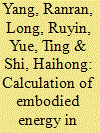|
|
|
Sort Order |
|
|
|
Items / Page
|
|
|
|
|
|
|
| Srl | Item |
| 1 |
ID:
132602


|
|
|
|
|
| Publication |
2014.
|
| Summary/Abstract |
In order to find efficient trade measures to reduce China×s energy consumption and to provide theoretical support for the climate talks between China and America, we investigate the impact of Sino-USA trade on energy consumption from the perspective of embodied energy. An Environmental Input-Output Life Cycle Assessment (EIO-LCA) model was established to calculate the total energy consumption coefficient, the direct consumption coefficient and the complete consumption coefficient of the sectors of the national economies of China and America. After taking into consideration the data of every sector of the national economy in Sino-USA trade, energy embodied in the import and export trade between China and America was calculated to verify the real energy flows in Sino-USA trade. The research results suggest the following: China is the net exporter of embodied energy in Sino-USA trade, and coal, crude oil and natural gas are the major components. In 1997-2011, the net exports of China×s embodied energy totaled 1523,082,200 t of standard coal, the amount of China×s energy consumption increased by 895,527,900 t of standard coal, and America×s energy consumption decreased by 11,871,200 t of standard coal as a result of Sino-USA trade. On this basis, corresponding policies and recommendations are proposed.
|
|
|
|
|
|
|
|
|
|
|
|
|
|
|
|
| 2 |
ID:
125078


|
|
|
|
|
| Publication |
2013.
|
| Summary/Abstract |
Accounts of international energy affairs often present a divergence between geopolitical/realist and liberal market-based approaches. This article suggests that this state of affairs reflects the (often implicit) legacies of realist and rationalist international thought in the study of energy affairs and the corresponding political and economic ontological hierarchies of analytical frameworks employed in different accounts of energy politics. Consequently, this article recommends a greater explicit attention to scientific ontological foundations in studies of energy relations and, in line with the calls of Keating et al. and Strange, suggests an approach based in the literature on I/GPE, which merges political and economic ontological axioms, as most apposite for the study of energy affairs. Building on this framework, and giving particular examples from the context of Eurasian energy politics, this article then outlines a number of politico-economic heuristic models (structural diversity, territorial non-coincidence, milieu-shaping and market-authority bargains) that are particularly useful concepts in helping to explain the intricate interactions of international energy relations.
|
|
|
|
|
|
|
|
|
|
|
|
|
|
|
|
|
|
|
|
|